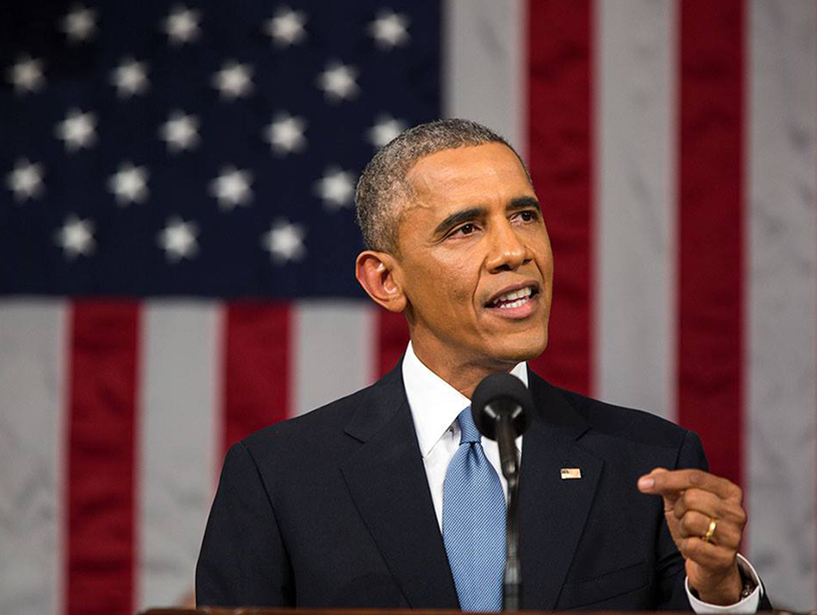President Barack Obama hammered away on the need for action on climate change and on meeting critical infrastructure needs during the State of the Union address delivered on 20 January in the U.S. Capitol in Washington, D. C. In his sixth State of the Union, the president said that 14 of the 15 warmest years on record have occurred in this century. “No challenge poses a greater threat to future generations than climate change.”
“I’ve heard some folks try to dodge the evidence by saying they’re not scientists; that we don’t have enough information to act,” he stated. “Well, I’m not a scientist either, but you know what? I know a lot of really good scientists at NASA, and at NOAA, and at our major universities, and the best scientists in the world are all telling us that our activities are changing the climate. And if we don’t act forcefully, we’ll continue to see rising oceans, longer, hotter heat waves, dangerous droughts and floods, and massive disruptions that can trigger greater migration and conflict and hunger around the globe. The Pentagon says that climate change poses immediate risks to our national security. We should act like it.”
In his speech, Obama argued that his administration has “done more than ever to combat climate change, from the way we produce energy to the way we use it.” He said the November 2014 U.S.-China joint announcement on climate change is leading to other countries stepping up “and offering hope that this year the world will finally reach an agreement to protect the one planet we’ve got.”
Obama added, “I will not let this Congress endanger the health of our children by turning back the clock on our efforts. I am determined to make sure that American leadership drives international action.”
Although Democrats at the Capitol applauded his remarks on climate change, Republicans generally were silent or dismissive. U.S. Sen. Jim Inhofe (R-Okla.), the new chair of the Senate Environment and Public Works Committee, responded to the address, stating, “Our nation’s energy industry deserves the credit for the growth we see today. We are experiencing an energy revolution in spite of the president’s policies that are intended to stifle the development of our domestic resources.”
Inhofe continued, “The president’s war on fossil fuels and nuclear energy is most evident in his unbridled mandates being issued by the EPA [U.S. Environmental Protection Agency]. While he markets these regulations as a means to save us from global warming, a recent NERA [National Economic Research Associates] study predicts the president’s climate agenda would only reduce [carbon dioxide] concentration by less than one-half of a percent; it would only reduce the average global temperature by less than 2/100th of a degree; and it would only reduce the rise of sea levels by 1/100th of an inch, or the thickness of three sheets of paper.”
Meeting Infrastructure Needs
Obama’s State of the Union address also focused on meeting infrastructure needs. “Twenty-first century businesses need 21st century infrastructure—modern ports, and stronger bridges, faster trains and the fastest Internet. Democrats and Republicans used to agree on this. So let’s set our sights higher than a single oil pipeline,” he said, referring to the controversial Keystone XL pipeline. “Let’s pass a bipartisan infrastructure plan that could create more than 30 times as many jobs per year, and make this country stronger for decades to come. Let’s do it. Let’s get it done.”
Republicans were quick to pick up on the infrastructure theme. Senate Majority Leader Mitch McConnell (R-Ky.) said that a bipartisan infrastructure project is a good idea and that the Senate would resume work on a Keystone jobs bill. However, President Obama previously has indicated that he would veto Keystone pipeline legislation, in part in deference to an ongoing U.S. Department of State review of the project.
The Senate, on 21 January, held several votes on amendments to the Keystone XL Pipeline Act (Senate bill 1) related to climate change. The Senate voted 98-1 in favor of an amendment introduced by Sen. Sheldon Whitehouse (D-R.I.) that states, “It is the sense of the Senate that climate change is real and not a hoax.” On an amendment introduced by Sen. Brian Schatz (D-Hawaii) stating that “human activity significantly contributes to climate change,” the vote was 50-49, less than the 60-vote threshold for passage.
—Randy Showstack, Staff Writer
Citation: Showstack, R. (2015), Obama highlights climate change and infrastructure needs, Eos, 96, doi:10.1029/2015EO022573. Published on 23 January 2015.
Text © 2015. The authors. CC BY-NC 3.0
Except where otherwise noted, images are subject to copyright. Any reuse without express permission from the copyright owner is prohibited.

